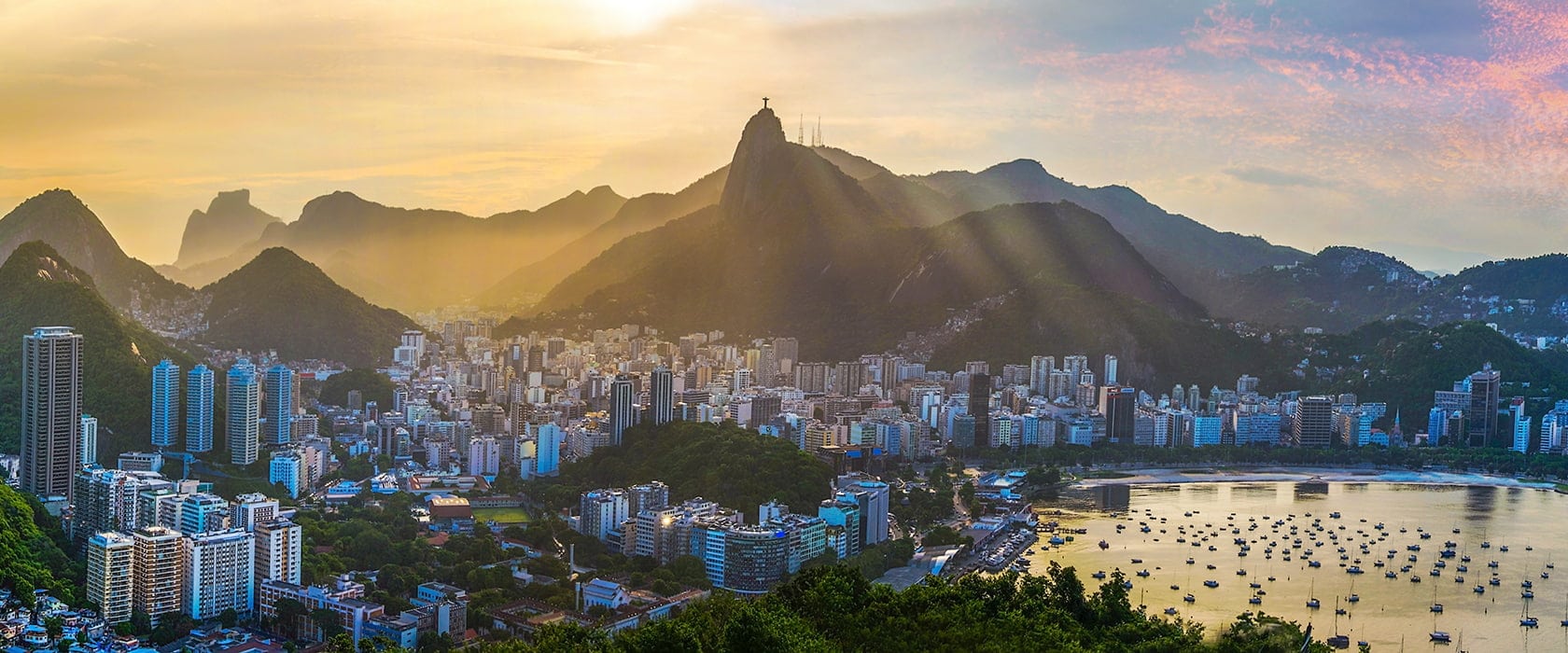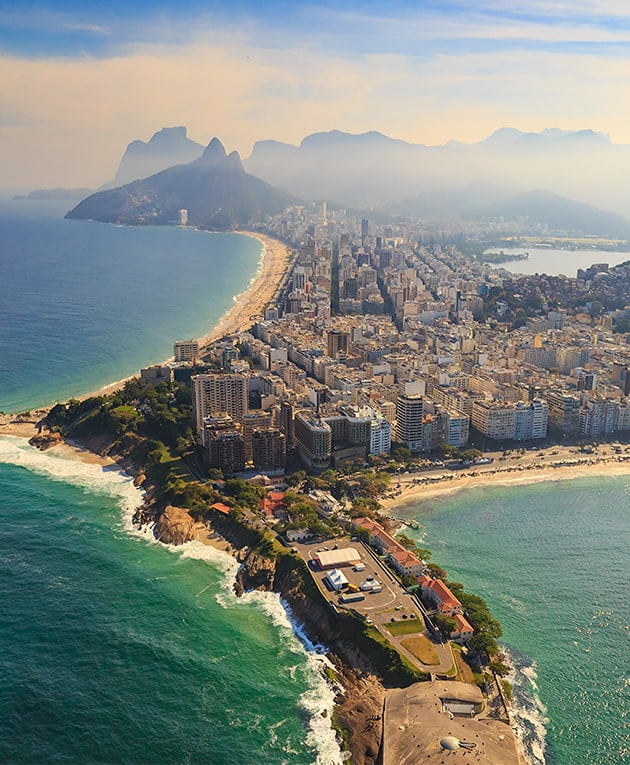-
Popular search terms
A Comprehensive Guide to Studying in:
Brazil

Those who choose to pursue an MBA in Brazil will truly have an experience like no other. Stunning natural landmarks rub shoulders with manmade triumphs throughout this vast country, which is the sixth-biggest in the world. In Brazil, you’ll find one of the seven modern wonders of the world (Christ the Redeemer), the biggest city in Latin America (São Paulo), and a capital city that took just 41 months to build (Brasilia). In the last decade alone, Brazil hosted the FIFA World Cup and Olympic Games along with the yearly Rio Carnival, the largest carnival in the world that attracts more than two million festival-goers per day. Brazil is a melting pot of cultures, climates, and colors that has to be seen to be believed.
The years following the collapse of the Brazilian military government in 1985 saw a huge increase in the number of private higher education institutions. Today, there are around 2,600 public and private universities across the country, a number which is growing rapidly. If you wish to study in Brazil, it is totally free to do a master’s degree at one of the country’s public universities, many of which are rated among the best in Latin America. With a growing reputation for higher education and amazing sights throughout the country, you would be hard-pressed to find a more exciting study destination than Brazil.

Frequently Asked Questions
FAQ
Did You Know? Fun Facts About Brazil
- 1 Brazil is the fifth-largest country in the world and the largest country in Latin America.
- 2 Brazil is famed for its football team. They have won the FIFA World Cup more times than any other nation.
- 3 Major industries in Brazil include iron and steel production, automobile assembly, petroleum processing, chemicals production, and cement making.
- 4 Brazil has been the largest producer of coffee in the world for over 150 years.
- 5 Famous Brazilians include football player Neymar, supermodel Gisele Bündchen, and writer Paulo Coelho (author of "The Alchemist").
Which Visas & permits do i need in Brazil
If you are a citizen from a Latin American country, you do not need a visa to do an MBA in Brazil (with the exceptions of Guyana and Suriname). All other students need a student visa – you’ll need to apply for one before entering Brazil at the nearest Brazilian Embassy or Consulate in your home country. Your student visa is valid for the entire duration of your study. You need to register your visa with the Federal Police within the first 90 days of arrival. You can only do this by making an appointment via the Brazilian Federal Police website in order to receive a National Migration Registration Card (NMRC).
Once you’ve made your appointment, visit the offices of the Federal Police at the Rio de Janeiro International Airport. Make sure to bring confirmation of your appointment, your visa application form, your original birth certificate, your passport, two passport photos, and proof of payment of the application fee (R$204.77, equivalent to US$43.22). Note that you are not allowed to work alongside your studies as an international student in Brazil.
Banking in Brazil
It can be difficult to open a bank account in Brazil as an international student. Your best bet would be to contact your local bank in your home country and check if they have an international branch or partner bank in Brazil. Cash is still widely used in Brazil, but it is becoming more and more digital. In smaller cities, cards are accepted but in rural areas and towns, it’s best to have some cash on hand.
If you would like to open a bank account in Brazil, you can visit a local branch of a bank and bring documents such as your visa, proof of identity, your national tax ID number, proof of address, and proof of income. It is also advisable to bring a Portuguese speaker with you if you do not speak the language, as many bank workers are not required to learn English. The most popular banks in Brazil are Banco de Brasil, Caixa Economica Federal, Bradesco, and Itau.
What do I need to know about healthcare in Brazil
Everyone in Brazil – including foreign residents such as international students – has guaranteed access to medical care, provided by the public national health system. This entitles you to free doctor visits, hospitalization, surgery, and prescription drugs. However, many Brazilians (around 20%) choose to take out private health insurance to gain access to better care.
International students can also purchase private health insurance in order to study in Brazil. The country has hundreds of insurance firms that offer various types of medical plans at different prices. Some private health insurance policies require that you pay the hospital bill up front and then get reimbursed afterward, while others will pay the bill immediately. In any case, it is always best to check each policy carefully and compare policies.
Housing options for students in Brazil
Both Brazilian and international students in Brazil typically live in shared rental apartments, as on-campus accommodation is not the norm at Brazilian universities. Apartments in Brazil can cost anywhere between R$1,600 and $2,300 (US$337-485). In big cities like Rio de Janeiro and São Paulo, rent can be more expensive. Thus, apartment sharing among students is popular, as it can dramatically cut rental costs.
Some Brazilian universities offer homestay programs, placing students with local families to experience the real Brazilian way of life. Host families represent a wide range of experiences, from a grandmother living alone to a couple living together to a large family with young children. Monthly rent for homestay programs ranges from R$1,900 to $2,230 (US$400-470), depending on the location and whether meals are included.
What are the public transport options in Brazil
Brazil is home to a vast public transport system, consisting of buses, metros, taxis, trains, and boats. In major cities, like São Paulo and Rio de Janeiro, public transport is easy and convenient to use, while options are more limited in smaller cities and towns. Buses are the most common form of transport – cost and safety vary per location. Metros are also clean and safe, but metros in the big cities tend to be very crowded.
You can buy a rechargeable travel card to get around. Metros fares, for example, are R$3.50-3.80 (US$0.73-0.80) per ride. Getting a taxi is also a fast, cheap, and safe way to move around the city. Renting a car in Brazil might give you more freedom and flexibility. Make sure to apply for an International Driving Permit to be able to drive – also note that you will need to keep some cash on you to pay tolls along the road.
How much does a Big Mac cost in Brazil
The Big Mac Index was invented by The Economist in 1986 as an informal way of measuring the purchasing power parity (PPP) between two currencies. The price of a Big Mac in Brazil is R$22.90 (equivalent to US$4.83, EUR€4.50, and JP¥614). For US$50, you can buy 10 Big Macs.
The cost of living in Brazil is relatively low and will depend on your lifestyle. On average, you should budget around R$2,400 (US$507) per month, excluding rent. In larger cities like São Paulo and Rio de Janeiro, living costs will be slightly higher.